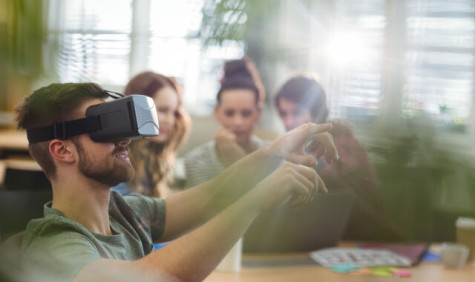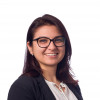Institutions take the lead in metaverse applications
"The idea of a collective virtual shared space, often made possible by technological advances such as virtual reality, augmented reality and the Internet." This is how metaverse is described in SURF's report Introduction of Metaverse (2023). Metaverse is taking an increasingly prominent place in education and research. We discuss visions and expectations with four board members. One thing is certain, this is not going away.
Virtual worlds are in the spotlight. The European Commission assumes that this concept will transform the lives of EU residents. Programmes within the Nationaal Groeifonds have their focus on the underlying technologies. Also, many institutions are already exploring the possibilities, conducting pilots and even creating their own content. To what extent do education and research institutions have a grip on developments or will we soon be taken by surprise?
Alternative world of experiences
Talland College is an MBO with several branches in North Holland for some 17,000 students. Omar Ramadan, ahair of the board: "As one of five institutions within the international project XREATE, we are working on metaverse applications for education."
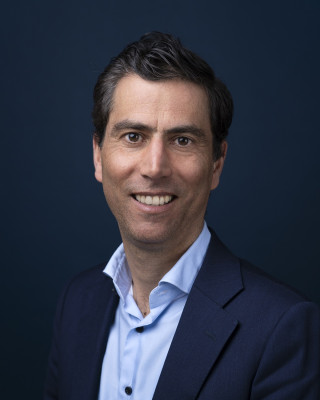
"Where it ends up, I don't know. But that metaverse is going to be big, I think for sure. The question is: who is in charge in education? Will we depend on big tech to offer our education in the metaverse or will we have a directorial role ourselves? Who creates the content?
XREATE is a project in which institutions from five countries each create a digital twin. Within that, we create digital experiences. Soon, a Dutch hospitality student will be able to watch paella being prepared, including the culture in Spanish cuisine. Which is very different from ours.
Metaverse is an alternative experience. It is not a replacement for physical vocational education, but a support, for example to learn skills.
By leading the way, creating content ourselves and collaborating in it, we use the power of being able to share very easily. Content developed at one ROC can then be exchanged with other ROCs following minor adjustments. And for collaboration with the business community, there are more opportunities. They can give guest lectures and assignments in the metaverse that students can work on together.
There is now a good connection between MBO and HBO with the continuous learning line. But the way of learning should also be equivalent. If one sector is much further ahead with metaverse than another, the transition is going to be a barrier rather than a trampoline.
The development of metaverse does not depend on how eager education is in the Netherlands. It a global development that is happening. The question is how eager education is in the Netherlands."
Back to the future
Erasmus University Rotterdam opened the Immersive Tech Space in early 2024. A place to experiment with new technologies for education and research, and to share experiences. As far as chair of the board Ed Brinksma is concerned, we are going "back to the future".
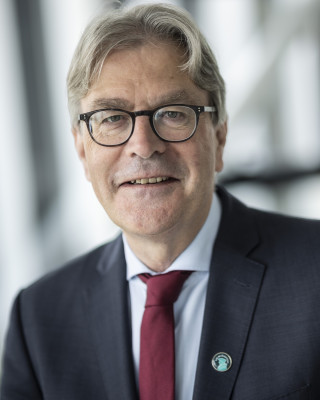
"We need to move forward in technology and at the same time with methodology back to much more critical considerations about 'what is really true'. There is not yet the attention for that, which I think is necessary for it to go well.
Virtual worlds have been seen in technology for some time. But where it's heading is that you can have not only mathematical simulations, but also social simulations. You literally step into a digital environment where you can experimentally study how something goes, or doesn't go, and where it gets stuck. For these applications, we are in an exploratory phase. In the Immersive Tech Space, people can work on this together.
Is reality limited to the physical world or does it go further? An experience in the virtual world can be just as real for someone experiencing it. Based on what kind of action plans do you arrive at reliable insights?
Metaverse may also have repercussions for the business model of the physical university. It creates opportunities for quasi-physical interaction, with colleagues and fellow students, even from around the world. There is no single metaverse, and the question is whether it is desirable for there to eventually be some kind of main variant of that.
To arrive at a single vision in doing so is not easily possible. Our society is too complex for that, with lots of subsystems. What we can do is try to keep the differences between the visions limited.
What we stand for is finding the right balance between preparing our students for the new technology that will become part of their working world and training them to become critically thinking academic professionals."
Aligned
Amsterdam UMC is co-leader of the DUTCH project, in which academic hospitals, universities of applied sciences and 'educational technology' parties work together on digital and virtual learning and other new applications for surgical assistants, anaesthetists and diagnostic radiographers. Saskia Peerdeman, board member of Amsterdam UMC, advocates maintaining the energy while being careful.
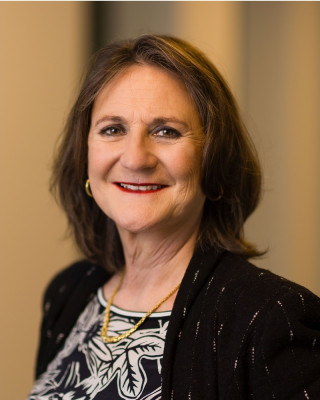
"What you notice is that applications are being embraced with unimaginable enthusiasm. This will never go away. Everyone sees opportunities, possibilities. I am a neurosurgeon and in the operating rooms we have been using augmented reality for years. My expectation is that everyone working in operating or interventional rooms will soon be pre-trained in a virtual world.
Then, for example, you can practise covering, pasting sterile drapes at the kitchen table with glasses on. Someone else, also sitting at home, watches from a distance. Then you take the skill to the workplace, where it is busy, time-pressured and a patient has unique forms. There, too, the system watches your actions and gives that back as feedback that you can then practise with at home.
A lot of professionals are working on pilots, mostly within their own profession. DUTCH, Digital United Training Concepts in Healthcare, is an example of a national platform in which we act together and make agreements on who will be the leader and how others will benefit.
The moment you step into such a project, it is important that all parties are on the same page. We are working on that now. You have to build a system: who will be in charge of what, who will take care of which quality areas, who will provide what money, who will decide which technologies will be used, etc.? But also, which private parties participate? Because it is extremely important that they too are on board.
I think if you want to unite, you have to do it around a clearly defined theme. Because so much is possible. In that, as far as I'm concerned, it's very important to properly investigate what really adds value."
Fragmented ecosystem
Saxion University of applied sciences is one of the co-organisers of the event on 3 July where the latest developments around eXtended reality will pass by: the National XR Day 2024. Anka Mulder, chair of the board: "XR can potentially offer many benefits. We think it is good to showcase it."
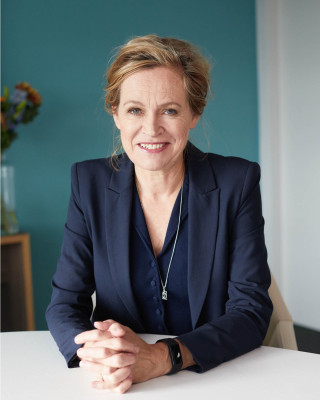
"We are experimenting within Saxion with different applications of XR both in education and research. An example from education is the use of VR in our Social Work course where difficult social situations are specifically trained. And there are digital avatars. Creative Media & Game Technology students once created a digital version of me for the opening of a college year.
It is always difficult to predict the future, but I can imagine virtual worlds contributing to a new way of personalised learning. Virtual worlds can simulate situations that we cannot train in the real world. And think, for example, of how effective it can be if a student trains medical procedures in VR at his or her own time and pace.
National XR Day connects lecturers, researchers and experts. It helps to bring the medium's potential into focus.
Currently, there is a fragmented ecosystem in the field of XR and virtual worlds with many providers often working on different platforms. To enable wide use in education, it is necessary to connect these worlds in a metaverse. Students, lecturers and researchers can then move more easily from one virtual environment to another.
I am not known as someone who sees only the risks of technology. But of course there are. We should not apply technology blindly just because it is there. So metaverse, XR and AI fine, but sensibly and with attention to ethics, privacy and security."
Becoming proficient with the metaverse
Institutions are actively working on applications for the metaverse. National and international collaborations are developing in which experimentation and piloting are central. There is a focus on developing content and sharing responsibilities. Training skills, sharing learning materials and cross-border cooperation seem to be the biggest promises of the new virtual world.
Text: Maureen van Althuis
"Institutions take the lead in metaverse applications" is an article from SURF Magazine.
Questions in response to this article? Mail to magazine@surf.nl.
